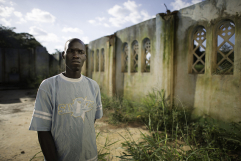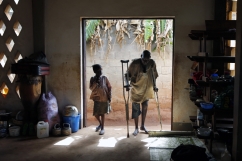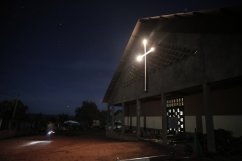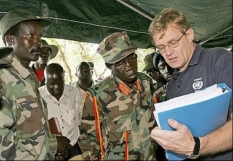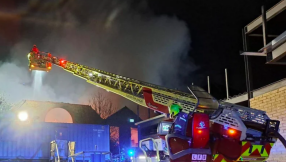Up to 10,000 children have been recruited by armed groups during the conflict in the Central African Republic (CAR) despite a U.N.-backed peacekeeping presence, the number rising sharply in the past two years, Save the Children said on Thursday.
Some children were abducted or forced to join such groups, while others signed up for food, clothing, money and protection, the international children's charity said in a news release.
Many joined up under pressure from peers or parents, to protect their community or avenge dead relatives, it said.
"Every morning we trained hard, crawling through the mud. The soldiers wanted to make us mean, unforgiving," it quoted Grâce à Dieu, who joined an armed group in December 2012 at the age of 15, as saying.
"When we fought, it was us, the children, who were often sent to the frontline. Others stayed further behind. I saw many of my brothers-in-arms killed while we were fighting," said Dieu, whose real name has been changed for his protection.
Julie Bodin, Save the Children's child protection manager in CAR, said the CAR government, U.N. peacekeepers and agencies, donors and nations contributing troops all had to try harder to prevent child recruitment and demobilize child fighters.
"They need to explain to armed groups why it is important to protect children. However, there are a lot of armed groups in CAR and each has a unique command structure, so there is a lot of work to undertake," Bodin told the Thomson Reuters Foundation by telephone from Bangui.
The CAR government was not immediately available for comment.
CAR was plunged into chaos when northern, mostly Muslim Seleka rebels seized control of the majority Christian country in March 2013, prompting a backlash by the largely Christian 'anti-balaka' militia.
More than 3,000 people have been killed since December 2013. The U.N. estimates 2.5 million, over half the population, need shelter, food and water, basic healthcare and education.
Children have borne the brunt of the violence - 80 percent of those who have had to flee their homes are women and children. Two out of 5 children in CAR lack vital humanitarian aid, according to the U.N. Children's Fund (UNICEF).
"Many of the children have been through things that no adult, let alone child should have to go through, witnessing the loss of loved ones, seeing their homes destroyed, and surviving in harsh and insecure conditions in the bush for months," said Bodin.
'MEAN, UNFORGIVING'
Children as young as eight are forced to fight, carry supplies, and perform other frontline and support roles. They often suffer physical and mental abuse by militants, and some have been ordered to kill, Save the Children said.
Having witnessed or committed killings and other violent crimes, children associated with armed groups are highly likely to suffer fear, anxiety, depression, grief, and insecurity, and many require specialized psychological support, it said.
Bodin highlighted the long term goals of supporting children once they have been released from armed groups to stop them rejoining. Extreme poverty, lack of education and jobs all create a huge reservoir of potential new recruits.
"It is important to support youth and children to pass from a culture of war and conflict to a culture of peace," she said.
"Child-friendly spaces and youth networks are urgently needed to rebuild these children's lives, as well as institutions, such as schools, which will help them thrive," said Bodin.
17-year-old Jean, from Kaga Bandoro, who managed to leave the Seleka and dreams of being a cassava farmer, said: "I'd like to return to school, and learn... I'd also like to be able to do some small trade and earn some money, and live my life."










